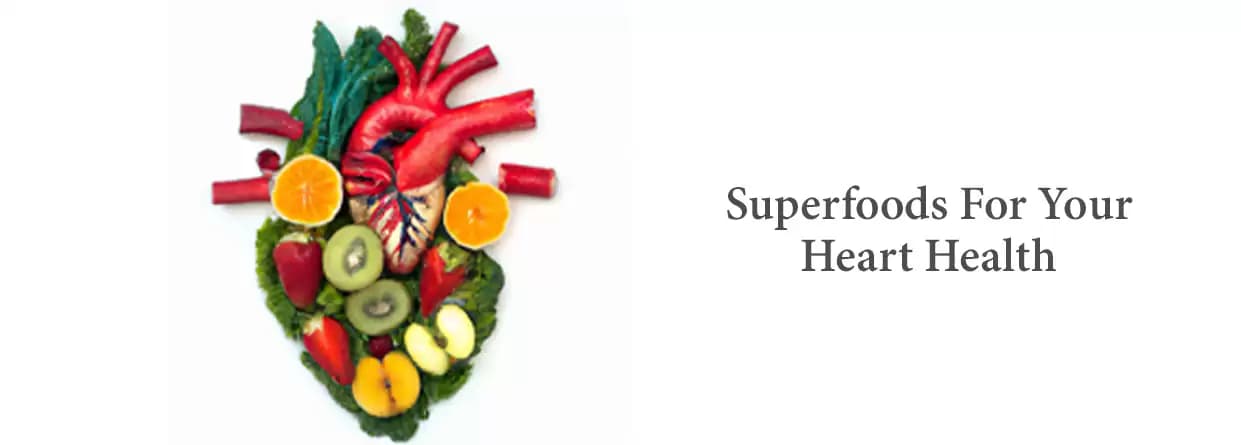
Heart diseases have become one of the worst nightmares for people around the world. Several cardiac disorders have been associated with unhealthy lifestyles and eating habits which gradually contribute to the improper functioning of the heart.
Heart diseases have become one of the worst nightmares for people around the world. Several cardiac disorders have been associated with unhealthy lifestyles and eating habits which gradually contribute to the improper functioning of the heart.
Unfortunately, heart diseases are also one of the leading causes of death worldwide. So, spreading awareness regarding the importance of heart-healthy foods is crucial. Fortunately, there are many heart-healthy foods for heart patients that can be consumed daily. These foods are especially beneficial for heart health and are considered "superfoods”. This blog contains a list of heart-healthy foods which are considered superfoods for heart health.
Fatty fish such as salmon, mackerel, tuna, etc. are excellent sources of omega-3 fatty acids which are essential for heart health. Omega-3s from fatty fish have a protective role in reducing inflammation, lower blood pressure, and decreasing the risk of heart disease.
Consuming fish is usually associated with a lower risk of cardiovascular diseases, depression and mortality. If you do not eat seafood, consuming fish oil in adequate amounts has been shown to reduce blood triglycerides, improve arterial function, and decrease blood pressure.
Strawberries, blueberries or raspberries are packed with several nutrients like antioxidants which can protect against heart diseases. They are also high in fibre and vitamin C, which are important for heart health. Studies suggest that eating a handful of berries can reduce several risk factors for heart disease.
Blueberries, especially, can improve the functions of blood vessels which can help control blood pressure and blood clotting. Also, you can add blueberries to your morning smoothie or oatmeal for a tasty and heart-healthy breakfast.
Leafy greens like kale, spinach, and collard greens are loaded with vitamins, minerals, and fibre. They are also low in calories, making them an excellent choice for weight management. Incorporate leafy greens into your diet by adding them to salads, soups, or smoothies.
Additionally, leafy green vegetables are high in vitamin K and nitrates. This can help reduce blood pressure and improve arterial function thus, reducing the risk of heart disease. Vitamin K protects your arteries and prevents blood clotting. Studies show that a higher intake of leafy greens is associated with a lower risk of heart disease.
Nuts such as walnuts are rich in healthy fats, fibre, and protein, all of which are beneficial for heart health. They are also packed with vitamins and minerals like vitamin E, magnesium, and potassium. Snack on a handful of nuts, or add them to salads, oatmeal, or yoghurt.
Research suggests some varieties of tree nuts, particularly walnuts are beneficial in preventing cardiovascular disease. Therefore, a diet supplemented with walnuts can lower LDL levels and total cholesterol.
Avocado is a great source of healthy fats, fibre, and potassium. It also contains antioxidants that can help reduce inflammation and protect against heart disease. Add avocado to your toast, salad, or smoothie for a heart-healthy boost.
Several studies also reveal that encouraging avocados on a daily basis can lower lipids and have a cardioprotective effect. In fact, one avocado can have 975mg of potassium or about 28% of the amount which you need in a day.
Whole grains like oats, quinoa, and brown rice include all three nutrient-rich parts of the grain germ, endosperm, and bran. Common types of whole grains include -
They are high in fibre and have been shown to reduce the risk of heart disease. They also contain important vitamins and minerals like magnesium and selenium. Swap refined grains for whole grains in your diet to reap the heart-healthy benefits.
In conclusion, incorporating these superfoods into your diet can help reduce your risk of heart disease and improve your overall health. Remember to aim for a varied diet with plenty of fruits, vegetables, and whole grains, and limit your intake of processed and fried foods.
Additionally, several other foods like beans, dark chocolate, tomatoes, almonds, etc. must be encouraged in the diet for a healthy heart. For example, beans are high in resistant starch which has been shown to reduce levels of cholesterol and triglycerides, lower blood pressure, and decrease inflammation. Encouraging a heart-healthy diet can improve the quality of life and ensure negligible cardiac problems. Your heart will thank you for it! You can get in touch with a cardiologist expert in Kolkata at the BM Birla Heart Research Centre, the only cardiology hospital in the eastern region.
Written and Verified by:

Dr. Sabyasachi Pal is a Senior Consultant in Cardiology Dept. at BM Birla Heart Hospital, Kolkata, with over 11 years of experience. He specializes in coronary interventions and heart failure management.
Similar Cardiology Blogs
Book Your Appointment TODAY
© 2024 BMB Kolkata. All Rights Reserved.